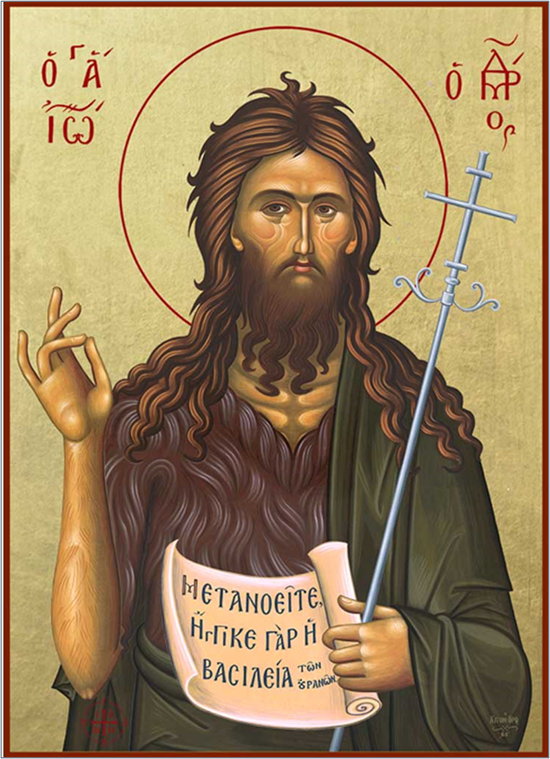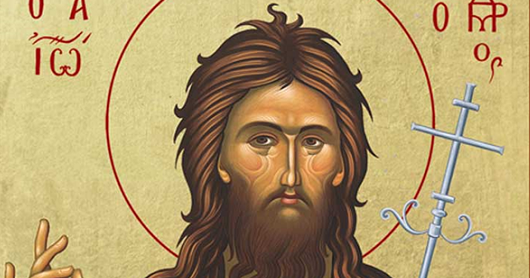John, Jesus, and Elijah
Second Sunday of Advent Scripture Readings

In the gospels, the nature and role of John the Baptist is anything but clearly defined. One fact that it seems that everyone—friend and foe alike—could agree on is that John was a prophet in the line of all the Hebrew prophets before him. There are a couple of details about him that we can be relatively certain of from the gospels. They are: that he was an ascetic who lived in natural and even crude simplicity and that he died a prophet’s death at the hands of Herod Antipas. He delivered a prophetic message of repentance and accompanied his message with a prophetic gesture, baptizing in the River Jordan those who accepted his message as a sign of their change of heart. We also know that, as a prophet, he recognized in Jesus, the son of his mother’s relative, Mary, someone very special. That pretty much sums up what we can learn from the gospels. The rest is interpretation and speculation.
John himself may not have been entirely clear in his understanding of who God had called him to be. If the gospel reports are historically accurate, John only claimed to be the voice from the Prophet Isaiah that proclaimed [40:3], “In the wilderness prepare a way for the Lord! Make straight in the wasteland a highway for our God.” The image that Isaiah presents is the Lord God restoring Israel to its former status as through a second Exodus. Evidently, John saw himself as the herald of this new Exodus and the restoration of Israel through the coming of the Servant of Yahweh, the new Moses, the new David, the Messiah.
There was—and still is—a deeply-held belief based on a passage from the Prophet Malachi [4:5] that God will “send the prophet Elijah to you before that great and dreadful day of Yahweh comes.” In Mark’s gospel passage, he hints that John is Elijah, the great prophet, come again as precursor to the Messiah when he describes John as “…clothed in camel hair, with a leather belt around his waist.” That echoes the description of Elijah from the Second Book of Kings [1:7-8] where Ahaziah, King of Samaria, recognizes the prophet by his clothes. “The king asked [the messengers], ‘What was the man like who met you and said these things to you?’ They replied, ‘He wore a hairy garment with a leather belt around his waist.’ ‘It is Elijah the Tishbite!’ [the king] exclaimed.” And yet, John himself not only refused to identify himself with Elijah, but it seems that he, too, was looking for Elijah when he said, “One mightier than I is coming after me.” There is good reason to speculate that John believed that it was Jesus himself who was Elijah.
The gospels also suggest that, at first, Jesus also failed to identify John as Elijah but, as his mission progressed and John was beheaded, Jesus changed his perspective. He admitted to Peter, James, and John in the Gospel of Matthew, “that Elijah has already come and they did not recognize him but did to him whatever they pleased.” [17:12] In other words, the appreciation for the role of John the Baptist in the history of God’s interactions with humanity grew as John, Jesus, and the disciples experienced the unfolding of Jesus’s mission.
What can we say about the special relationship between John and Jesus? We know from Matthew’s gospel that John’s mother and Jesus’s mother were related. If so, John and Jesus must have at least known about one another when they were growing up. We can only guess whether the two spent any time together, or not. I suspect they did. At that time, there was a large and important religious community on the shores of the Dead Sea known as Qumran. They practiced a spartan form of Judaism, living simple communal lives. They used water extensively, not only for baptism as a sign of repentance and forgiveness but also for frequent washings for ritual purification. They were also scholars, making copies of the Law and the Prophets, as well as writing extensive tracts on spirituality and their rule of life. Here’s a question I’ve seldom heard asked: since Jesus’s father, Joseph, was a blue-collar worker, where did Jesus get the wherewithal to learn to read and write at a time when very few—only the scribes and Pharisees and the priestly caste—had that skill? And where did Jesus study the Scriptures to the extent that he was recognized as a teacher from the first moments of his public life? Some people—including me—believe that both Jesus and John the Baptist spent their early years living and learning with the Qumran community. That Jesus excelled John in learning and wisdom can be inferred by the deference John always showed him in the gospels.
There’s one last footnote that we can add to the background of today’s gospel text. John the Baptist had a large and loyal following. He had disciples who were as dedicated to John as Jesus’s disciples were to him. When John was executed, his disciples didn’t give up. They were convinced that John was a great prophet, maybe Elijah, and maybe even the Messiah himself. They continued practicing John’s baptism for the forgiveness of sins even after his death. We can see clear evidence that, when the gospels were written, the evangelists wanted to stress that Jesus, and not John was the Messiah and that John himself had said as much publicly. How much anti-John the Baptist sentiment colored the gospels’ treatment of him is anyone’s guess.
Now if, as the gospel tells us, John the Baptist was “proclaiming a baptism of repentance for the forgiveness of sins,” what did we need Jesus for? Haven’t we been brought up to understand that Jesus died on the cross for the forgiveness of our sins, and that Christian Baptism washed away “original sin”? But, if John’s baptism was for the forgiveness of sins, isn’t Christian Baptism redundant? At least Saint Paul didn’t think so. When he arrived at Ephesus on his first visit to that fledgling community of believers, he asked them, “’Into what, then, were you baptized?’…‘The baptism of John,’ they replied. Paul explained, ‘John’s baptism was a baptism of repentance. He told the people to believe in the One coming after him, that is, Jesus.’” [Acts 19:3-4]
Repentance—that change of mind and heart that we call metanoia—for the forgiveness of sins is not the core of the Christian message. Instead, that is the preparation for receiving the Christian message. Just as John’s message of repentance paved the way for Jesus’s proclamation of the coming of the Reign of God, so John’s baptism of repentance was a precursor to Christian Baptism into the death and resurrection of Christ and our adoption as children of God by the gift of the Holy Spirit. One is a turning away from sin and death, the other is the entrance into a new life.
So, that’s where we are now as we continue our observance of this Advent season. We remember who we are. We look backward to the ancient faith tradition of the prophets and John the Baptist, as we look forward as a people constantly in need of spiritual renewal. We’ve already experienced that change of mind and heart that brings about forgiveness of sins. Now, repentance means making those tiny little adjustments to our attitudes and behaviors that we need to remain aligned with the will of God. With the birth of Christ, the reign of God has come for us. Assured of God’s forgiveness, we move forward toward our celebration of the coming of God’s Kingdom and our Baptism into Christ that has made us a part of it. And, with all of creation this morning, we cry out joyfully, “Maranatha! Come, O Christ the Lord!”
Get articles from H. Les Brown delivered to your email inbox.
